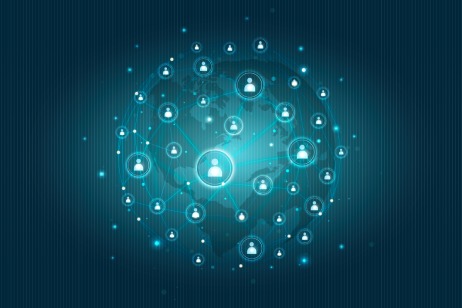-
If you've been following the evolution of the infrastructure enabling smart contract development and blockchains, the term "blockchain oracles" might seem familiar. In its data-rich environment, the blockchain sector is developing. Any external data must be manually added to a blockchain; it cannot simply "communicate" with it. This requires a lot of work and is subject to bias or errors. However, blockchains can communicate in real-time with both other digital information and common objects like smart devices thanks to oracles.
What is a Blockchain Oracle?
Blockchain Oracles are similar to a third-party service provider. They link third-party applications and services to the blockchain and supply external data to smart contracts. Smart contracts and blockchains are isolated from the real world by purpose. To put it more technically, they are not intended to interact with off-chain information (not on the network).
A crucial connection between the blockchain and the off-chain and on-chain data they enable is made possible by blockchain oracles.
The accessibility of off-chain data increases the usefulness of smart contracts. It expands the possible applications for smart contracts.
Smart contracts would be less useful if there were no blockchain oracles because they couldn't connect with data from sources outside the network.
A blockchain oracle functions as a solution layer that verifies, examines, and queries data sources that are not part of the blockchain. It provides the outcomes as soon as processing is complete.
The data provided by the blockchain oracle might also be anything of value. For instance, a healthcare system could employ oracles to ask about insurance information. On the other hand, the food industry will look to oracles to communicate information about the chain of manufacturing and distribution of food goods.
Also, Discover | Blockchain Bridges | Enabling Cross-Chain Interoperability
Distributed Oracles
Decentralized oracles supply smart contracts with information, which is more reliable than information provided by centralized oracles since it does not rely on a single source of truth. These oracles have the same objectives as open blockchains. Even though they aim for a trustless system, they disseminate trust across many people rather than eliminating it.
- They address the issue of centralized oracles having a single point of failure. This guarantees that the smart contract will continue to work as intended even if one of the oracles is unable to perform as expected for any reason.
- It establishes end-to-end decentralization by combining numerous independent Oracle node operators and numerous dependable data sources.
Centralized Oracles
This particular type of oracle is used as the only data source for smart contracts and can only be accessed by one party. Dependence on a single data source, however, is risky since it makes the smart contract susceptible to manipulation.
- One major problem of centralized oracles is that they are susceptible to a single point of failure.
- Additionally, it increases the vulnerability of smart contracts to threats and other types of harm.
You may also like to explore | A Definitive Guide to Smart Contract Development Tools
Use Cases
Because blockchains lack a natural way to access data outside of the chains themselves, the oracle is particularly crucial for decentralized finance (DeFi) applications. Despite this, oracles are beneficial for almost all businesses since they gather, organize, and securely authenticate information without compromise.
Oracles can be used to increase the security of dynamic NFTs and the growing number of interactions in GameFi, guarantee that patients, doctors, and other authorizers like employers and health insurance providers receive the best care while maintaining the privacy of their data, improve the efficacy and management of the supply chain, source how and where products are produced like pharmaceuticals or foods to prevent harmful products from reaching the general public and validate the sustainability of those products.
These are just a few advantages, demonstrating that oracles can be used for purposes other than cryptography and that they can make society's operations safer and more secure.
How Oracles Influence the Future of the Metaverse
Oracles will be a crucial tool and a key indicator of Web3's success when it comes to providing metaverse experiences as true to reality, as accurate as possible, and as complementary to our physical reality as feasible.
Oracles in the metaverse unlock tools for dApps like lotteries, loot boxes, randomized NFT projects, play-to-earn games, raffles, and more while acting as a reliable link between the physical and virtual worlds. It will be easier to develop more robust and equitable metaverse experiences across augmented reality, artificial intelligence, and NFTs if these services can be provided in a fully autonomous, trustless, decentralized manner.
Additionally, Web3 and the metaverse depend on cross-chain connectivity to function properly. Oracles will be required to connect the multi-chain ecosystem and allow seamless movement from metaverse application to application because so many applications are being developed with a variety of characteristics and requirements. This will result in a fully open and simple-to-navigate world.
Also, Check | Web3 App Development | Building a Decentralized Future
Closing Remarks
The widespread use of blockchains depends on a dependable system that enables communication between smart contracts and the outside world. Without blockchain oracles, smart contracts would be forced to rely solely on the knowledge that already exists within their networks, greatly reducing their potential.
Decentralized oracles may create safety nets that would significantly reduce systemic risk in the blockchain ecosystem. For the blockchain ecosystem to develop, blockchain oracles continue to be one of the fundamental building blocks that must be applied in a secure, dependable, and trustless manner.
If you have a project in mind related to smart contracts and want to get started it, you may also connect with our experienced smart contract developers.

Our Offices
INDIA
Emaar Digital Greens, Sector 61,
Gurugram, Haryana
122011.
Welldone Tech Park,
Sector 48, Sohna road,
Gurugram, Haryana
122018.













